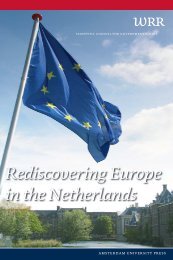The Western Condition - St Antony's College - University of Oxford
The Western Condition - St Antony's College - University of Oxford
The Western Condition - St Antony's College - University of Oxford
Create successful ePaper yourself
Turn your PDF publications into a flip-book with our unique Google optimized e-Paper software.
On the strategic use <strong>of</strong> the ‘Turkish model’<br />
other ascendant Islamist movements such as Tunisia’s an-Nahda) praise Turkey’s leaders and<br />
ostensibly strive to emulate its ‘governance model’, they also contribute to the AKP’s regional<br />
leadership agenda. At the same time, the Brothers hope to conform sufficiently to the politicoeconomic<br />
and security demands <strong>of</strong> the US and its regional allies to be categorised as ‘moderate<br />
Islamist’, like their Turkish counterparts. Are these synergies sustainable? A growing number <strong>of</strong><br />
factors suggest otherwise, and these might become more prominent in the longer term.<br />
<strong>The</strong> Plot: Contradictions and limits to the model discourse<br />
First, there may be good reasons to question the long-term compatibility <strong>of</strong> Turkey’s regional<br />
leadership ambitions and the reception <strong>of</strong> this agenda in the Arab Middle East. To interpret<br />
Turkey’s regional popularity as an appetite for the emergence <strong>of</strong> a new hegemon in the region<br />
seems problematic, particularly if the potential hegemon in question is not only not Arabicspeaking,<br />
but also perceived as neo-Ottoman. 20 Despite the affinities between the AKP and<br />
various ascendant Islamist movements across the Arab world, Turkey remains an external actor<br />
in the Arab geography. And while in public Turkish <strong>of</strong>ficials emphasise a shared social, cultural<br />
and historical heritage and downplay any hegemonic agenda, references to the Ottoman Empire<br />
do not usually evoke the same l<strong>of</strong>ty memories as in Turkey itself <strong>of</strong> harmonious co-existence<br />
among former Ottoman subjects in the Middle East and the Balkans. In the minds <strong>of</strong> AKP<br />
cadres, as well as <strong>of</strong> the mainstream Islamist constituency in the country, the bloody final<br />
decades <strong>of</strong> the empire, oppression, ethnic cleansing and genocide simply do not feature very<br />
highly. This is not so for those, particularly in the Balkans, but also in the Arab nation-states, for<br />
whom the Turkish domination remains a relatively recent and vivid collective memory.<br />
Moreover, as Reem Abou El-Fadl argues, expressions <strong>of</strong> popular Arab approval for Turkey tend<br />
to imply “certain expectations and demands made <strong>of</strong> Arab leaders, rather than purely<br />
representing an analysis <strong>of</strong> Turkish behaviour.” 21 In other words, especially before the uprisings<br />
Turkey has been seen as filling a vacuum in the absence <strong>of</strong> strong Arab leadership in the region. 22<br />
But the prospective emergence <strong>of</strong> such leadership would challenge Turkey’s regional popularity<br />
and ambitions. Egypt, with its well-substantiated claim to leadership <strong>of</strong> the Arab world, is once<br />
again the most likely contender for that title. To the extent that the country manages to move<br />
20 <strong>The</strong> observation that Turkey’s regional popularity has continued to rise following the outbreak <strong>of</strong> the Arab<br />
uprisings is based on two annual surveys in the region: ‘Euro-Mediterranean Policies and the Arab Spring’, Euromed<br />
Survey <strong>of</strong> Experts and Actors 2011, European Institute <strong>of</strong> the Mediterranean, Barcelona, 2012; Mensur Akgün and<br />
Sabiha Senyücel Gündoğar (eds) Ortadoğu’da Türkiye Algısı 2011 (TESEV Yayınları, January 2012).<br />
21 Reem Abou-el-Fadl, ‘Arab Perceptions <strong>of</strong> Contemporary Turkish Foreign Policy: Cautious Engagement and the<br />
Question <strong>of</strong> Independence’, p. 247.<br />
22 See Azmi Bishara, ‘Turkey’s Recent <strong>St</strong>ances are Party Choices, not those <strong>of</strong> the <strong>St</strong>ate, Islam Online Interview<br />
(Arabic), 10 March 2009; Gamil Matar, ‘Turkey Returns to the Arabs’, Al-Shorouk (Arabic), 5 December 2009;<br />
Salama Ahmed Salama, ‘Admiration for Turkey: Why?’, Al-Shorouk (Arabic), 18 January 2010; Talal Salman, ‘Waiting<br />
for an Arab Erdoğan’, As-Safir (Arabic), 31 March 2010.<br />
16

















